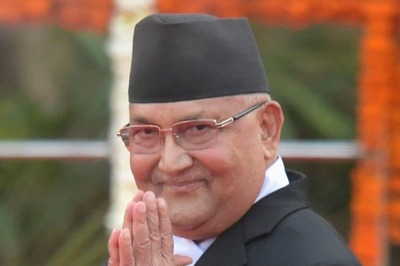
views
Kolkata: The Bharatiya Janata Party (BJP)’s campaign in Bengal started on an inauspicious note.
While permissions from the Trinamool Congress government were hard to come by, the situation only worsened BJP national president Amit Shah contracted swine flu days before his January 22 rally in state.
Shivprakash, BJP’s national general secretary and an old RSS hand, decided to call Uttar Pradesh CM Yogi Adityanath instead. Both Yogi and the BJP’s state unit were happy with the arrangement.
But Shah argued that while Yogi could talk about Hindutva, the political agenda for the BJP needed to be underscored. The fight had to be taken to Mamata Banerjee, at her own bastion.
Eventually, the rally was brought forward by two days and an ailing Shah spoke for half an hour. But this marked the beginning of the campaign – one marked by an aggressive attack on Banerjee by the BJP’s top functionaries, aided at every step by old RSS hands — Shiv Prakash, Arvind Menon and Sunil Deodhar
Hindutva’s connection to Bengal is something that neither the BJP nor RSS tire of reiterating.
Rashtriya Swayamsevak Sangh (RSS) founder KB Hedgewar’s stint as a medical student in Calcutta was greatly influenced by Bengal’s radical nationalists.
His successor MS Gowalkar’s time at the Ramakrishna Math was a factor in his understanding of Hindu nationalism, as one characterised by ideas of service and renunciation.
It was on Hedgewar and VD Savarkar’s advice that Shyama Prasad Mookherjee became the president of the Hindu Mahasabha, after joining the organisation in 1939 and would later, go on to form the Bharatiya Jana Sangha (BJS), the BJP’s predecessor.
However, from 1952, when the BJS contested from six of Bengal’s 36 seats and won two with a vote share of 5.59%, to 2019, when the BJP contested from 42 seats and won 18 with a vote share of 40%, the politics of Hindutva in the state has come a long way.
Throughout this, the RSS has remained a constant, albeit changing form over the decades.
The RSS has been present in Bengal since the 1939, but failed to grow in the decades of the Left rule.
The Sangh’s headquarters at the nondescript ‘Keshav Bhavan’ in North Kolkata’s 9A, Avedananda Road (Beadon Street) remained shrouded in obscurity.
That changed with the rise of identity politics in 2011 after Banerjee’s victory, and especially after the 2014 victory of Narendra Modi at the Centre.
The key to counter the Trinamool Congress’ organisation on the ground was the RSS network of workers with the experience of “jan sampark” (people’s connect), led by these three silent Sangh warriors who worked closely with Kailash Vijayvargiya, who was appointed as the observer for the party in the state replacing Siddharth Nath Singh.
On October 3, 2018, Amit Shah appointed national executive member Arvind Menon as its Bengal co-minder.
A former RSS pracharak and a Bengali speaker, he is touted as a “master strategist” with skills to spread the mass base to rural areas.
Ahead of the general election, News18 had spoken to Menon. He had said, “People are angry with Banerjee because they feel cheated by her. The TMC’s condition in Bengal will be worse than that of the CPI(M). TMC goons left no stone unturned to harass and threaten us and our senior leaders like Modiji and Amit Shahji. I think people will respond to this and the BJP is going to secure a large number of seats which is beyond your imagination in Bengal.”
Menon had played a key role in the 2017 Gujarat assembly election.
When asked about the challenges he faced in Bengal, he said, “We are like post cards — whatever address my party will write, we will reach there. I am a true soldier of my party and with the hard work of all us, including Kailash Vijayvargiyaji, Shivprakashji, Dilip Ghoshji and the entire BJP team in Bengal, we are going to create a history in this Lok Sabha.”
Shivprakash, who worked closely with Shah in the 2014 Lok Sabha election, was given the responsibility of organisational affairs primarily in West Bengal and also in western Uttar Pradesh and Uttarakhand.
His extensive work at the grassroots level helped the BJP improve its vote-share in Bengal from 4.1% in 2011 Assembly election to nearly 11% in 2016.
Subsequently, the party improved its performance in the panchayat election and increased its vote-share from 17.2% in the 2014 general election to over 40% this time.
Shivprakash said, “My biggest challenge was to bring a ‘parivartan’ (change) in Bengal because it became a concern as far as national security (due to illegal immigrants) is concern. In 2015, I was given the responsibility of Bengal and since then, my primary job was to ensure better coordination among party cadres and win the confidence of Bengali people.”
“We succeeded in our task and the simple reason is despite spreading misinformation about the National Register of Citizens (NRC), people in Bengal understood it and welcomed our decision. Therefore, despite the NRC issue, a large number of people voted for us,” he said.
“I don’t know why people are surprised with the BJP’s rise in Bengal. It’s a misconception that no one can stand in front of the Trinamool Congress in Bengal. This misconception was generated due to 34 years of Left rule. Bengal is just like any other state, but you have to find out the right way to move forward,” he added.
He, however, refused to accept that the BJP fought elections on religious line in Bengal.
“Bengal moved towards Modi ji because of his ‘Sonar Bangla’ vision,” he added.
Another silent warrior and low-profile former RSS pracharak was Sunil Deodhar.
This quintessential man is known for his committed ideologue with excellent management skills.
He came in the limelight after he was assigned to look after Modi’s Varanasi constituency in 2014. Not the least, he was also the man behind the BJP’s huge win in Tripura in 2018.
Soon after securing Tripura from the Left Front, Shah assigned Deodhar the responsibility of Bengal.
“The biggest challenge for me in Bengal was streamlining the organisation unlike Tripura where we managed to strengthen our base. The booth-level and ‘mandal’-level functioning was absent in Bengal. Ultimately election is fought on booth level. We took the challenge and over the months, we managed to streamline this and we got a good response,” Deodhar said.
“We have noticed that in the last two-three years of Banerjee’s rule, there was mismanagement and political crime was at its peak. The Trinamool Congress indulged in vindictive politics. Even the Congress didn’t indulge in such vindictive politics. The ‘Modi-wave’ was also present across the country and people in Bengal were looking for a change.”



















Comments
0 comment